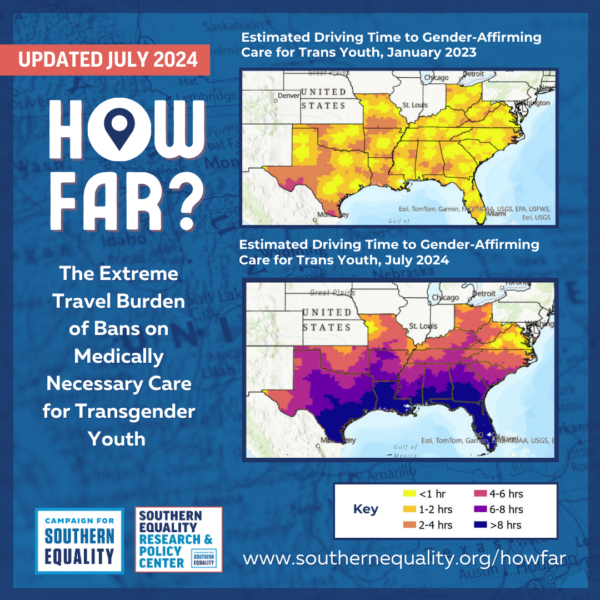 This May, South Carolina passed one of the most extreme gender-affirming care bans in the country, prohibiting transgender youth under 18 from accessing gender-affirming care, as well as preventing public funds, like Medicaid insurance, from being used to cover gender-affirming care for people of any age. With this law now in effect, nearly every state in the South has now passed legislation restricting access to gender-affirming healthcare for transgender youth.
This May, South Carolina passed one of the most extreme gender-affirming care bans in the country, prohibiting transgender youth under 18 from accessing gender-affirming care, as well as preventing public funds, like Medicaid insurance, from being used to cover gender-affirming care for people of any age. With this law now in effect, nearly every state in the South has now passed legislation restricting access to gender-affirming healthcare for transgender youth.
Overall, 25 states have passed bans on gender-affirming care for trans youth. A case concerning the ban in Tennessee will be heard next term by the U.S. Supreme Court.
While some bans have been blocked by court rulings, and are no longer in effect, access to care has still been disrupted for transgender youth across the South. Click here for a nationwide map of where youth gender-affirming care bans have passed and where they are in effect or on hold pending litigation. Unable to access lifesaving healthcare in their home states, families of transgender youth are being forced to travel long distances to access care.
In an effort to illustrate the impact gender-affirming care bans have on families of transgender youth, the Campaign for Southern Equality and the Southern Equality Research & Policy Center have updated our April 2024 report, “How Far? The Extreme Travel Burden of Bans on Medically Necessary Care for Transgender Youth.” The report has now been updated to include the effect of South Carolina’s ban on gender-affirming care.
The 15-page report (click here to read the full piece) includes:
- GIS mapping that illustrates how gender-affirming care bans have significantly increased the driving time required to access gender-affirming care for families in the U.S. South (see graphic below).
- Factors beyond driving time that make accessing gender-affirming care increasingly difficult for families living in states with bans.
- An estimation of the financial burden of traveling to access gender-affirming care with sample budgets for out-of-state trips that are based on the experiences of families we serve.
- Narratives illustrating the full impact that traveling, or moving, to access medical care has on families of transgender youth, including not just the time and money spent, but the social and emotional costs.
The distance between Southerners and gender-affirming care clinics for young people has skyrocketed. For example:
- Houston, TX: It now takes 8.9 hours (601 miles) of one-way driving time (roundtrip: 17.8 hours, 1,202 miles) to get to a clinic that serves youth.
- Nashville, TN: It now takes 3.2 hours (208 miles) of one-way driving time (roundtrip: 6.4 hours, 416 miles) to get to a clinic that serves youth.
- Jackson, MS: It now takes 6.3 hours (422 miles) of one-way driving time (roundtrip: 12.6 hours, 844 miles) to get to a clinic that serves youth.
This report draws on the knowledge Campaign for Southern Equality (CSE) staff have gained through launching the Southern Trans Youth Emergency Project (STYEP), which serves as a resource center for families, helping them access out-of-state healthcare options so their child can continue to receive uninterrupted care, and providing travel grants of $500 to defray the financial burdens resulting from these bans. Since the launch of the project in March, CSE has distributed more than $500,000 in direct travel grants to over 800 families and individuals across fifteen states. The organization proudly collaborates with partner organizations in every state to make this program possible.
Emma Chinn (she/her pronouns), Communications & Policy Manager of the Campaign for Southern Equality and one of the authors of the report, said today:
“With the passage of South Carolina’s gender-affirming care ban, families of transgender youth living in the South have even fewer places to turn for the lifesaving healthcare their children need. What was once a regularly scheduled doctor’s appointment with a trusted provider has now become an arduous journey. Traveling out-of-state for care is complicated, expensive, and puts enormous strain on families. By documenting the impact of these bans and providing direct support to impacted families, our team is honored to work with families to ensure transgender youth can get the healthcare they need, no matter where they live.”
Families of transgender youth in Southern states who need support accessing gender-affirming care should contact the Southern Trans Youth Emergency Project at www.southernequality.org/styep.

